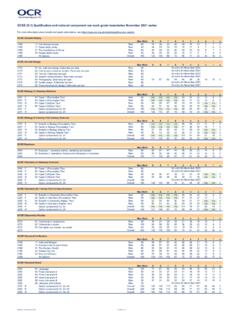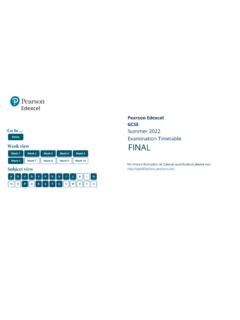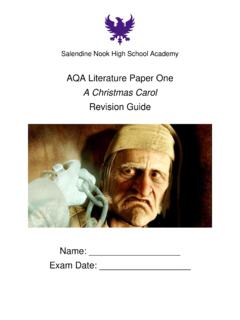Transcription of GCSE English Literature - Colonel Frank Seely Academy
1 gcse English LiteratureYear 10: Summer BookletYour own personalised, unparalleled, hand-crafted guide to tackling and surviving Unseen Poetry from your trusty English department!Unseen PoetryWhat even is it?We all know gcse English Literature is broken into two papers aptly named Paper 1 and, you guessed it, Paper 2. Paper 1 covers shakespeare and the 19th century novel. Paper 2 covers Modern Texts and Poetry. Section C of Paper 2 is the Unseen Poetry section which is worth 32 marks in total (more than the anthology poetry section!), but we re going to be focusing on just the 24 mark skills do I need?
2 The great part about this section is that you already have the skills you need: you ll be making fabulous inferences and finding quotes to back up your ideas (AO1) and then analysing and exploring how the poets use language, form, and structure to create effects and meanings by using subject terminology (AO2). Basically, everything you have done throughout your time in English from Year 7 until now: you are given a text of some sort to read and peruse; afterwards we write about the choices the writer has made and what this may suggest to us as linguists.
3 We definitely want to stress that there is no mark for context (AO3) in this section! The poems are unseen, therefore the examiners will not expect background knowledge about the poem or the contexts they were written in you ve never seen them before, so of course, you would not have revised is also true for gcse English Language, so treat it like one of those questions! Read, infer, do I need a booklet?Lockdown has not been easy for anyone and we want you to know that we re putting as much support in place as possible to support you through Year 11 and your gcse exams next year.
4 This booklet will be a guide to an element of the exam that is full of transferable skills that will help with every topic across English Literature and English QuestionWhat does it look like?This is a 24 mark question and will be about one poem you ve (most likely) never seen before. There is also an 8 mark question which is about comparison of method, but that s a story for another This question will always be about something referenced in the poem, so that s your first hint for annotation. If you re asked about how regret is presented, look for references to regret!
5 You will always be asked how does the poet present something, but that s all you know. What should I do first?Read and understand the question. Simple. Many people might think you should read the poem first, but we also want you to know that exams are as much about timing and organisation as they are about knowing how to analyse. Therefore, we really recommend you highlight/underline/circle/however you d like the keywords in the question. We ve highlighted the keywords in the question below: How does the poet present his feelings about growing old?
6 Using those three keywords, we would know we d be looking at a poem about age and growing old, and that the poet will be presenting how they feel about this. We can already have our ideas building as we read the should I structure my answer?PETAL paragraphs are great, and if you have all five of those elements in each point you make, then you are good to go! Some of you will want to stick to the PETAL structure, and some of you will want to start to write in your own format. Either structure to analytical writing is absolutely fine as long as you have a point, evidence to prove that point, terminology, analysis of that evidence using the terminology and what it symbolises and suggests, and finally a No, really!
7 SMILE is an easy way to annotate and understand a poem. We ve added in several ideas you might want to consider. This is the part for what questions through our annotations. When it comes to writing, we move onto the how on readerHow many stanzas are there? How many lines do the stanzas have? Are the stanzas uniform (similar lengths, for example)? Are the lines uniform? Is there a rhyming scheme? Is there enjambment (this could be in Structure or Language)?What do you think the poem is about? What else could the poem be about?
8 What is the purpose of this poem (what does it want to achieve by being read)?What are the key images created in the poem? Are there any repeated images or patterns created through the imagery? What sensory description is used to create the images?What lexical classes are used (concrete noun, modal verb, preposition, and so on)? What linguistic techniques are used? What poetic techniques are used? What structural techniques are used? What semantic fields are created?Is sympathy created by the poet for the reader? Is empathy created by the poet for the reader?
9 How does the poet want us to feel?Check the Glossary at the back of this booklet for specific examples!Poem #1 Getting Better? Watts The alcohol. The fighting. It was hard to take seeing them like this. The late nights. The tears. Me waiting for all of this to end. I didn't want to hear it, but I knew it was coming. When it only got worse I knew I couldn't keep running. Then the day came when they both sat us down. They said 'I'm so sorry but we're over now.' I cried and ran to my room through my tears it was hard for me to see. The hurt in my heart made it hard for me to breath.
10 The next day dad left. He cried when he hugged me and said 'See you soon. I will call you later, and I will always love you.' I took it the hardest. I was full of sadness and hate. I tried to forget I didn't need the pain. Mum treats me different now. I look just like him. I ignore them and close myself off. I don't let anyone in. No-one knows my pain. I don't let them. I'm just glad we can still see him. People ask 'When will you open up and tell me how you feel?' I tell them never. Cause acting like it never happened helps it get better?Immediately, the rhetorical question in the title is something we can focus on and begin the understanding that there is an uncertainty from the poet.




